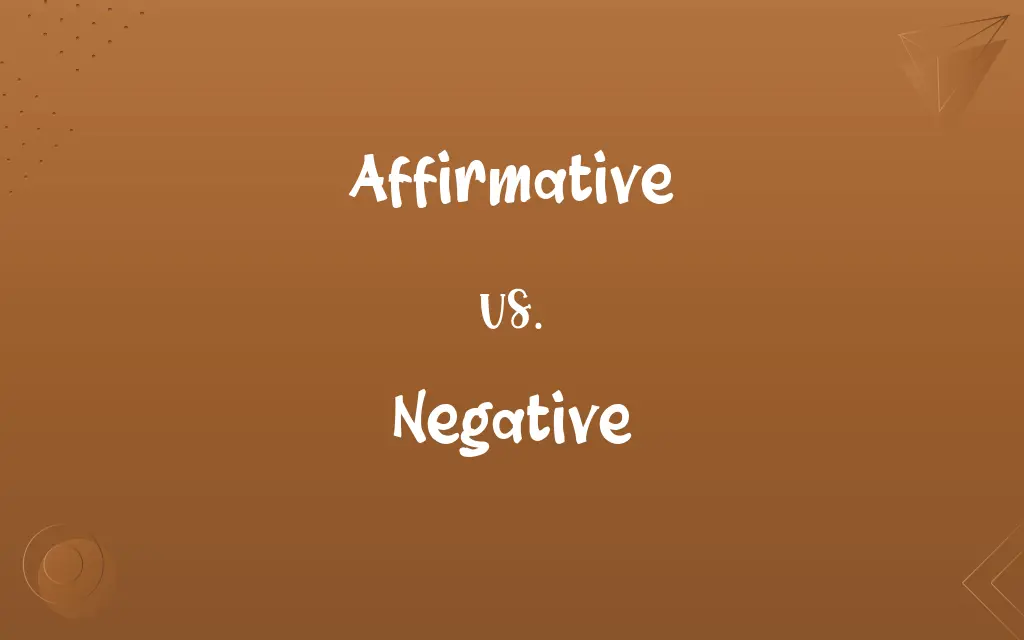Affirmative vs. Negative: Know the Difference

By Shumaila Saeed & Dua Fatima || Updated on March 5, 2024
Affirmative responses confirm or agree, highlighting acceptance; negative responses deny or disagree, emphasizing rejection or contradiction.

Key Differences
Affirmative responses indicate agreement or confirmation of a statement or question. They often imply a sense of approval or positivity towards an idea or proposition. On the other hand, negative responses signify disagreement, denial, or the absence of something. These responses can reflect opposition or a different viewpoint from what is proposed.
Shumaila Saeed
Mar 05, 2024
While affirmative answers are used to assert the truth or validity of a statement, such as in "Yes, I will attend the meeting," negative responses are utilized to refute or reject a claim, evident in replies like "No, I won't be able to make it." This distinction highlights the roles each type of response plays in communication, either opening the door for affirmation or closing it with denial.
Dua Fatima
Mar 05, 2024
In terms of emotional impact, affirmative responses can encourage a positive atmosphere and promote constructive dialogue. Conversely, negative responses, depending on the context and delivery, might introduce a more critical tone or create barriers to agreement. However, both types of responses are crucial for clear and honest communication.
Shumaila Saeed
Mar 05, 2024
The choice between affirmative and negative responses can also significantly affect decision-making processes. Affirmative responses tend to move discussions forward and can lead to action or resolution, whereas negative responses might halt progress temporarily but also serve as a means to reassess and refine ideas or proposals.
Hifza Nasir
Mar 05, 2024
In linguistic contexts, affirmative and negative are used to categorize words, phrases, or clauses that either confirm or deny information. For example, using "do" or "does" in questions to anticipate an affirmative answer, while incorporating "don't" or "doesn't" indicates an expectation of a negative reply.
Shumaila Saeed
Mar 05, 2024
ADVERTISEMENT
Comparison Chart
Definition
Confirming or agreeing to a statement or question.
Denying or disagreeing with a statement or question.
Shumaila Saeed
Mar 05, 2024
Emotional Impact
Generally promotes positivity and agreement.
Can introduce criticism or disagreement.
Shumaila Saeed
Mar 05, 2024
Communication Role
Encourages acceptance and forward movement.
Serves as a means of refusal or halting progression.
Shumaila Saeed
Mar 05, 2024
Decision Making
Aids in advancing discussions towards resolution.
May cause a pause for reassessment or refinement.
Shumaila Saeed
Mar 05, 2024
Linguistic Function
Used to assert truth or approval.
Utilized to express denial or contradiction.
Dua Fatima
Mar 05, 2024
ADVERTISEMENT
Affirmative and Negative Definitions
Affirmative
Confirming the truth of a statement.
Her affirmative nod confirmed her participation.
Dua Fatima
Mar 05, 2024
Affirmative
Positive in nature.
The project received an affirmative assessment from the team.
Shumaila Saeed
Mar 05, 2024
Negative
Indicating the absence of something.
The test results came back negative.
Shumaila Saeed
Mar 05, 2024
ADVERTISEMENT
Negative
Used to contradict a statement.
The evidence provided a negative to the initial hypothesis.
Shumaila Saeed
Mar 05, 2024
Affirmative
Indicating agreement.
He responded in the affirmative to the invitation.
Shumaila Saeed
Mar 05, 2024
Negative
Rejecting a proposal or idea.
He gave a negative to the suggestion.
Shumaila Saeed
Mar 05, 2024
Affirmative
Reflecting a constructive approach.
She had an affirmative answer to every problem.
Hifza Nasir
Mar 05, 2024
Negative
Pessimistic or unfavorable.
Her negative outlook on life was disheartening.
Shumaila Saeed
Mar 05, 2024
Affirmative
A word or statement of agreement or assent, such as the word yes.
Shumaila Saeed
Oct 19, 2023
Negative
Indicating opposition or resistance
A negative reaction to the new advertising campaign.
Shumaila Saeed
Oct 19, 2023
Affirmative
(Logic) Of, relating to, or being a proposition in which the predicate affirms something about the subject, such as the statement apples have seeds.
Shumaila Saeed
Oct 19, 2023
Negative
A statement or act indicating or expressing a contradiction, denial, or refusal.
Shumaila Saeed
Oct 19, 2023
Negative
The refusal or withholding of assents; veto.
If a kind without his kingdom be, in a civil sense, nothing, then . . . his negative is as good as nothing.
Shumaila Saeed
Oct 19, 2023
Affirmative
Positive; - a term applied to quantities which are to be added, and opposed to negative, or such as are to be subtracted.
Shumaila Saeed
Oct 19, 2023
Negative
Expressing, containing, or consisting of a negation, refusal, or denial
Gave a negative answer to our request.
Shumaila Saeed
Oct 19, 2023
Negative
A statement or act that is highly critical of another or of others
Campaign advertising that was based solely on negatives.
Shumaila Saeed
Oct 19, 2023
Affirmative
A word or phrase expressing affirmation or assent; as, yes, that is so, etc.
Shumaila Saeed
Oct 19, 2023
Negative
A feature or characteristic that is not deemed positive, affirmative, or desirable
“As voters get to know his liberal views, his negatives will rise” (Richard M. Nixon).
Shumaila Saeed
Oct 19, 2023
Repeatedly Asked Queries
What is an affirmative response?
An affirmative response is one that agrees with or confirms the validity of a statement or question.
Shumaila Saeed
Mar 05, 2024
What does negative response mean?
A negative response indicates disagreement, denial, or the absence of what is being asked or stated.
Shumaila Saeed
Mar 05, 2024
Can negative responses be constructive?
Yes, negative responses can be constructive if they are provided with the intention of offering a different perspective or improving an outcome.
Shumaila Saeed
Mar 05, 2024
Why are affirmative responses important in decision-making?
Affirmative responses can facilitate decision-making by showing agreement, thereby enabling actions or resolutions to be taken.
Hifza Nasir
Mar 05, 2024
How do negative responses influence decision-making processes?
They can prompt reconsideration or refinement of proposals, acting as a necessary pause in the decision-making process.
Hifza Nasir
Mar 05, 2024
Can a response be both affirmative and negative?
Typically, a response is either affirmative or negative, but it can be nuanced, containing elements of both agreement and disagreement depending on context.
Shumaila Saeed
Mar 05, 2024
In what contexts are affirmative responses most commonly used?
Affirmative responses are common in situations requiring confirmation, agreement, or positivity, such as in approvals or consents.
Shumaila Saeed
Mar 05, 2024
Are affirmative responses always positive?
While affirmative responses are generally positive, the context and content of the communication can affect their perceived positivity.
Shumaila Saeed
Mar 05, 2024
When are negative responses most applicable?
Negative responses are suitable in situations of disagreement, refusal, or when expressing a lack of something.
Dua Fatima
Mar 05, 2024
How do affirmative responses affect communication?
Affirmative responses tend to promote a positive atmosphere, encourage agreement, and move discussions forward.
Shumaila Saeed
Mar 05, 2024
What impact do negative responses have on conversations?
Negative responses can introduce criticism or disagreement but are also essential for honest, clear communication and reevaluation of ideas.
Shumaila Saeed
Mar 05, 2024
Is it possible to convert a negative response into an affirmative one?
Yes, through negotiation or by addressing the concerns that led to the negative response, it's possible to shift towards an affirmative outcome.
Shumaila Saeed
Mar 05, 2024
Can cultural differences affect the interpretation of affirmative and negative responses?
Yes, cultural norms can influence how affirmative and negative responses are given, received, and interpreted.
Shumaila Saeed
Mar 05, 2024
How do language structures accommodate affirmative and negative responses?
Language structures accommodate these responses through specific word choices and grammatical constructs to clearly convey agreement or disagreement.
Dua Fatima
Mar 05, 2024
How can one effectively use negative responses without being offensive?
By being clear, respectful, and providing constructive feedback along with the negative response.
Dua Fatima
Mar 05, 2024
Share this page
Link for your blog / website
HTML
Link to share via messenger
About Author
Written by
Shumaila SaeedShumaila Saeed, an expert content creator with 6 years of experience, specializes in distilling complex topics into easily digestible comparisons, shining a light on the nuances that both inform and educate readers with clarity and accuracy.
Co-written by
Dua Fatima








































































